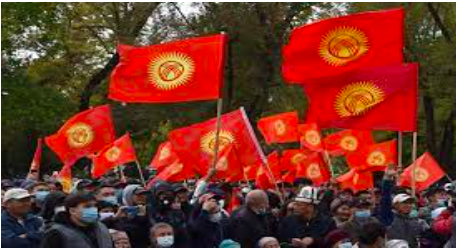Press freedom in Kyrgyzstan: An insight
Posted on : May 15, 2021Author : Nazia Jafri

As the world celebrated press freedom day recently a lookout in Central Asian states depict the improving press freedom status of the region of Kyrgyzstan. Kyrgyzstan has been the most consistent and stable country in the region in terms of freedom of media and communication, in-fact the region has often been described as the island of democracy in the entire central Asian region. According to the 2021 press freedom index which happened recently Kyrgyzstan got 79th rank and has moved significantly from its 82nd ranking. The rankings are done by taking into account 180 countries globally. The countries are also scored from 0-100 according to their media environment and higher scores imply that the worse media situations of the region. Kyrgyzstan stands at 30.37 score which is quite good as compared to the other Central Asian countries.
As Kyrgyzstan gained momentum at this time a deep look into the prevalent press environment in the region can’t be ignored. The country got freedom from Soviet rule in 1991 and made laws that ensured freedom of speech and expression. Article 16 of the constitution says, “everyone in the Kyrgyz Republic has the right to the free expression and dissemination of thoughts, ideas, and opinions and to free literary, artistic scientific and technical creativity, and freedom of the press and to broadcast and disseminates information”. Although it was mostly on paper and the region has witnessed some of the biggest protests and uprisings of the decades. There had been several instances when press and media freedom was curbed and journalists were supressed. But the important question is that despite of everything the country has managed to fare well. Over the years there have been significant changes in the political scenario of the country and press and media situations have been improving.
Among the five central Asian states Kyrgyzstan stands out and has been the only country that has attained under 100 rankings. It has been on an improvising status since the last three years. Among the other countries Uzbekistan went on one point low and was ranked 157, Tajikistan also fell down one point, to 162 rank, Turkmenistan rose slightly high with 178 rank but still among the lowest press freedom status in the world as it is just barely above the last two. Kazakhstan also moved two points above its last year’s rank and is on 155.
With the fall of Soviet Union and eventually Kyrgyzstan’s emergence as independent nation, the Kyrgyz media relished more freedom as compared to its neighbour Kazakhstan. By 2020, 1.8 thousand media groups were identified in the region and the number has been on a constant rise in the country since past five years. Newspaper houses such as Kyrgyz Tuusu, Vecherniy Bishkek, Erkin-Too, Bishkek Observer and many others are few of them only.
Since most of the countries of Central Asia remain clustered towards the bottom of the list it is noteworthy to study the changes in the Kyrgyz environment. Press freedom is a symbol of accessibility to freedom of speech and expression within societies. It implies the depth of freedom that lies within a society. Very often governments try to impose restrictions on these rights so that globally they attain a maintained image. Initially under the first president Askar Akayev, after Kyrgyzstan got independence from Soviet rule, the media and press laws were lenient and there was not very strict control on press. As a matter of the fact he made some reforms in the system as well but eventually when his corruption came into limelight he imposed severe restrictions. And the same footsteps were followed by his successor Kurmanbek Bakiyev. Libel became a criminal offence. Before his eviction he made sure that opposition views were not allowed in the press. After Bakiyev’s fall the situation started to improve and there was more of opposition’s say in the media.
After Bakiyev, Roza Otunbayeva came into power and she removed most of the impositions that were there on the press and media. She even led to investigations into the previous cases of abuses against the journalists and as well passed the resolution on de criminalising of defamation and libel. But in spite of all of this there was a well-entrenched weak system that was prevalent there. From their past experiences journalists feared to write against the political issues and there was a lot of self-censorship. Also many organisations started publishing news without even verifying the facts. Government also started warning media outlets against reports that generated inter-ethnic animosity in a strict way. The country was also facing economic weakness at that time which was reflected in its status of press. Although there were some reforms but it was not a very idealistic condition for the press to perform.
Otunbayeva was eventually succeeded by Almazbek Atambayev. Atambayev again criminalized defamation with punishment up-to three years in prison on the pretext of amendments in the law. Journalists again came into the curb of laws which prevented writing on public interests. This was the time when judges awarded heavy punishments to journalists who were critical on authorities and also the media was used extensively for political gains. Newspapers and journalists were fined heavily, if found, to be insulting the President. Many independent news websites were also blocked.
In 2017 Sooronbay Jeenbekov became President. At this time there were some significant changes in terms of press freedom in the country, but the reforms were not enough. Jeenbekov began by dropping all the hefty financial charges against some of the journalists who were framed under the defamation law. Jeenbekov was perceived as more progressive than his predecessors in the international community. Although he made some redemption towards media and press but still lawsuits and arrests were common feature and self-censorship was also getting promoted. Many small media organisation were forced to shut down. His final dent was the law on manipulating information, which was observed as a tight grip on freedom of media and press. By the end of 2020 he resigned and Sadyr Japarov became President.
Though there have been certain shortcomings but the last decade has also witnessed some of the major changes in terms of press freedom and the overall status of media improved in the region. The leaders might not have made very favourable amendments in the systems but an active and prominent civil society is also present in the region. As a result there are protests and demonstrations from time to time against any unfavourable laws and rules.
There are issues and problems with the media and press but the change is noteworthy. There are multiple challenges to the press freedom and growth in the region. Lack of financial resources, meagre salaries for journalists and unstable economic situations are just few of the prime reasons. Press freedom is on the rise since past three years in the region but the real issue is for the journalists. Very often they are not able to present what they procure. Politically sensitive topics are still not touched by many media outlets. Also religious and ethnic topics as well lack neutral coverage. The new power shift puts a lot of burden and responsibility on Sadyr Japarov and it will be interesting to see how he works on the same.
Readings:
The Media in Russia by Anna Arutunyan, 2009.
Dynamics of Political Development in Central Asia by Phool Badan, 2001.
Clan Politics and Regime Transition in Central Asia, Kathleen Collins, 2006.
Imagined Democracy? Nation-Building and Elections in Central Asia by D. Beacháin and R. Kevlihan.
RSF, 2021 World Press Freedom Index, Kyrgyzstan country report, https://rsf.org/en/ranking#
Are Youth Different? The Nazarbayev Generation and Public Opinion in Kazakhstan, Problems of Post-Communism , B. Junisbai and A. Junisbai, 2018.
Eurasianet, https://eurasianet.org/
Nazia Jafri
Adjunct Researcher, Asia in Global Affairs




